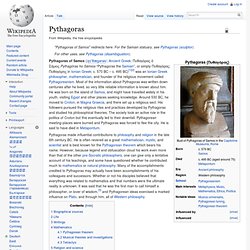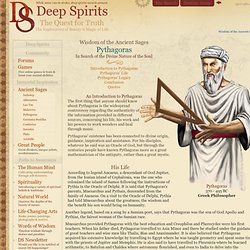

Pythagoras. Pythagoras. Pythagoras of Samos (/pɪˈθæɡərəs/; Ancient Greek: Πυθαγόρας ὁ Σάμιος Pythagóras ho Sámios “Pythagoras the Samian”, or simply Πυθαγόρας; Πυθαγόρης in Ionian Greek; c. 570 BC – c. 495 BC)[1][2] was an Ionian Greek philosopher, mathematician, and founder of the religious movement called Pythagoreanism.

Most of the information about Pythagoras was written down centuries after he lived, so very little reliable information is known about him. He was born on the island of Samos, and might have travelled widely in his youth, visiting Egypt and other places seeking knowledge. Around 530 BC, he moved to Croton, in Magna Graecia, and there set up a religious sect. His followers pursued the religious rites and practices developed by Pythagoras and studied his philosophical theories.
Pythagoras. Wisdom of the Ancient Sages In Search of the Divine Nature of the Soul An Introduction to Pythagoras The first thing that anyone should know about Pythagoras is the widespread controversy regarding the authenticity of the information provided in different sources, concerning his life, his work and his powers to work wonders and heal through music.

Pythagoras' existence has been connected to divine origin, guidance, inspiration and assistance. For his disciples, whatever he said was an Oracle of God, but through the centuries people have known Pythagoras more as a great mathematician of the antiquity, rather than a great mystic.